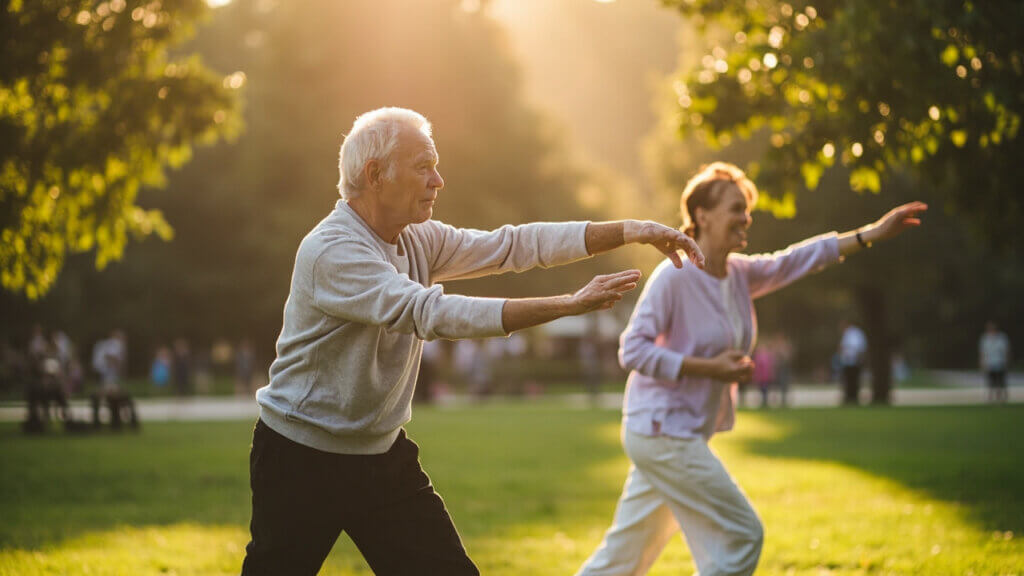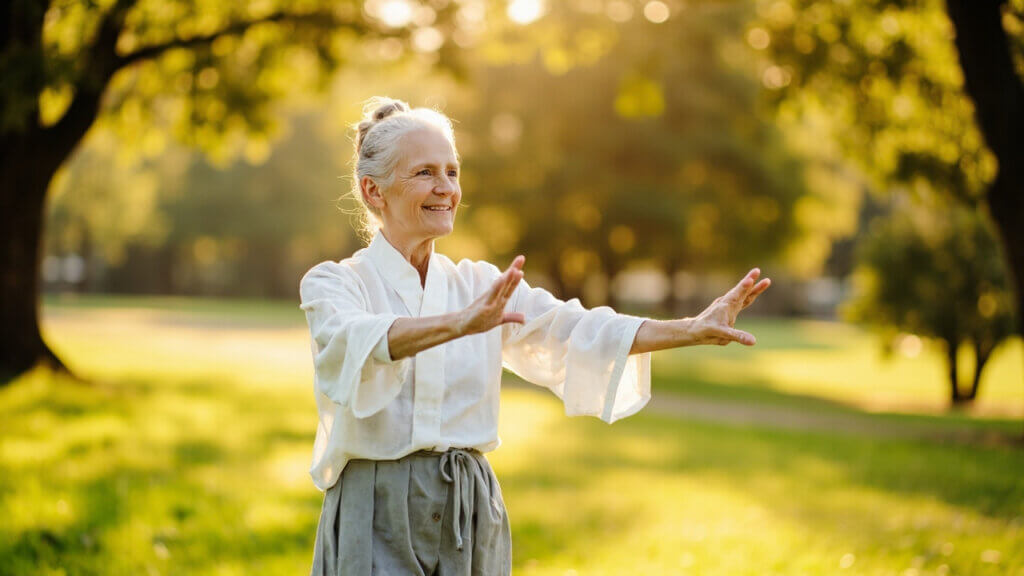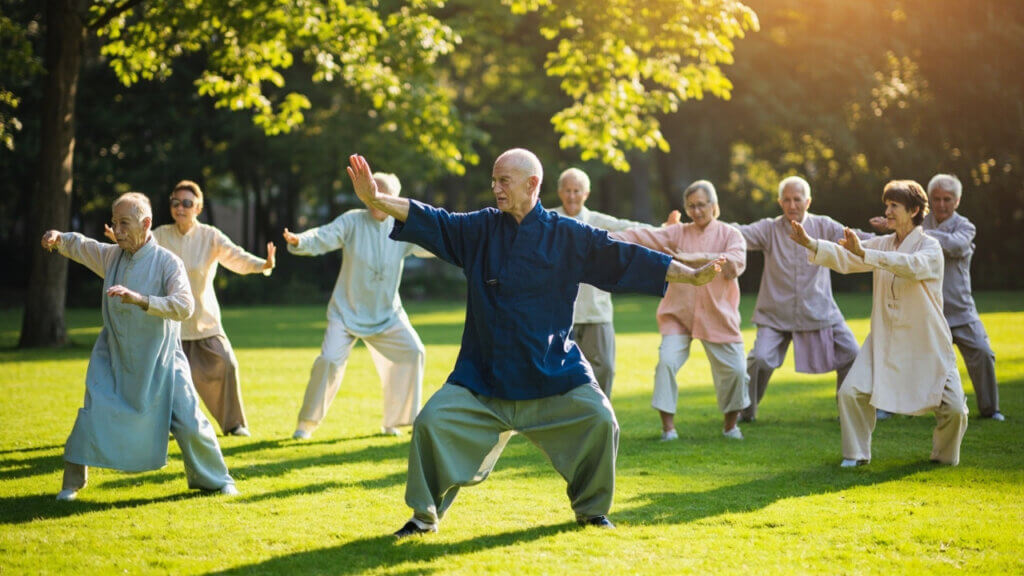If you’re looking for an exercise that’s gentle, effective, and feels good both during and after—you might want to try something ancient.
Tai Chi, a slow-moving martial art with roots in Chinese philosophy, is fast becoming a favorite among Americans over 50. And for good reason. This graceful practice doesn’t just improve balance—it enhances mental clarity, flexibility, joint health, and even mood.
Whether you’re trying to ease into fitness, manage stress, or support long-term health, Tai Chi checks all the boxes—without needing to break a sweat (or a knee).
What Is Tai Chi?
Tai Chi (pronounced “tie chee”) is often described as “meditation in motion.” It involves a series of slow, flowing movements performed in a standing position, paired with deep breathing and focused awareness.
Unlike high-impact workouts, Tai Chi is:
- Low-impact and joint-friendly
- Done standing—no getting on the floor
- Adaptable to any fitness level
- A blend of movement and mindfulness
You don’t need any special equipment or a gym membership. Just comfortable clothes, a few feet of space, and a willingness to slow down.

The Top Health Benefits of Tai Chi for People Over 50
Science is catching up to what millions have known for centuries: Tai Chi is good for your whole body—and mind.
H3: 1. Improves Balance and Prevents Falls
Falls are a leading cause of injury after 50. Tai Chi helps by strengthening stabilizing muscles and improving body awareness.
A 2023 meta-analysis found that regular Tai Chi practice reduced fall risk by 43% in older adults.
H3: 2. Strengthens Joints and Muscles
While it’s gentle on the body, Tai Chi activates deep muscles—especially in the legs, core, and back—without stressing the joints.
H3: 3. Boosts Cognitive Function
Tai Chi has been linked to improved memory, focus, and mental clarity. The combination of movement and mindfulness stimulates the brain in unique ways.
H3: 4. Reduces Stress and Anxiety
The rhythmic, meditative flow of Tai Chi activates the parasympathetic nervous system, calming the body and mind.
H3: 5. Enhances Sleep and Mood
Practicing just a few times a week can lead to deeper sleep, fewer nighttime awakenings, and reduced symptoms of depression.

Tai Chi vs. Yoga vs. Walking: What’s Best?
Walking is great for heart health.
Yoga offers flexibility and breathwork.
But Tai Chi brings a rare mix of movement, balance, and mindfulness that’s sustainable and enjoyable for older adults.
| Exercise | Impact on Joints | Balance Training | Mental Focus | Flexibility |
|---|---|---|---|---|
| Walking | Low | Moderate | Low | Low |
| Yoga | Varies | Moderate | High | High |
| Tai Chi | Very Low | High | High | Moderate |
Tai Chi may be the most well-rounded practice for people who want longevity, mobility, and calmness without strain or risk.
How to Get Started with Tai Chi After 50
1. Find a Beginner-Friendly Class
Many local senior centers, YMCAs, and parks offer free or low-cost Tai Chi classes. Look for:
- “Tai Chi for Arthritis”
- “Chair Tai Chi” (for mobility issues)
- Beginner or community sessions
You can also search online directories or ask your healthcare provider.
2. Try Online Videos
Can’t make it in person? Great YouTube channels and apps offer follow-along sessions, such as:
- Tai Chi Health for Life
- Dr. Paul Lam’s Tai Chi for Health Institute
- Better5 Seniors Fitness
3. Start Slow—5 Minutes Is Enough
You don’t need to master a full routine. Even five minutes a day of basic moves (like “wave hands like clouds”) can make a difference.
4. Listen to Your Body
Wear flat, comfortable shoes, stay hydrated, and avoid overextending. Tai Chi should feel smooth—not strained.

FAQs About Tai Chi for Seniors
Is Tai Chi hard to learn after 50?
Not at all. Tai Chi is meant to be learned slowly and at your own pace. Many beginners in their 60s, 70s, and 80s start with no prior experience.
How often should I practice?
Even 2–3 times a week offers benefits. Some seniors practice daily for 10–20 minutes and report better energy, posture, and sleep.
Can Tai Chi help with arthritis or chronic pain?
Yes. Tai Chi is widely used in arthritis programs. It improves joint flexibility and reduces stiffness while keeping the body moving safely.
Final Thoughts: A Timeless Practice for a Healthier, Calmer You
In a world that often feels loud and rushed, Tai Chi offers the opposite: peace, intention, and steady movement.
For those over 50, it’s more than just exercise—it’s a way to care for your body, clear your mind, and stay independent longer. No matter your fitness level, there’s a way in.
Why not start today? Step outside, breathe in deeply, and let your body move like water. You just might fall in love with the calm.
